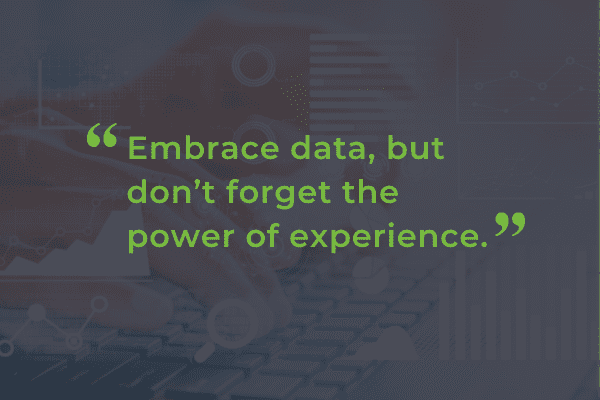We love data, it helps guide strategy, educate optimizations, and justify results. However, marketers today face immense pressure to base their decisions solely on data. Every agency claims to be “data-driven,” “analytics-focused,” or “AI-powered,” making it seem like anything else is outdated. But here’s the truth: marketing decisions are made with a balance of data and human expertise, roughly 80% data and 20% experience, skewing more heavily on experience for the discovery process.
Why? Because relying solely on data can lead to several pitfalls:
- Misconstrue Results: Data provides valuable quantitative insights, but it lacks the qualitative side of the story. It can lead to “tunnel vision,” focusing only on the aspects supported by the data and neglecting the broader context.
- Attribution Bias: Marketing software excels at tracking online actions like clicks, submissions, and referrals. However, it struggles with the offline world, outside influences like word-of-mouth recommendations, and other intangible factors that significantly impact our decisions.
- Misinterpreting Correlations: Data reveals correlations, but correlation doesn’t equal causation. Two changes happening in a short period of time doesn’t mean one caused the other. This can lead to missed opportunities and misguided strategies.
Data is essential, but it shouldn’t replace the valuable insights gained from experience. At Media Two we average 11 years of experience in managing and buying media. Having experienced marketers behind the keyboard allows us to:
- Understand the “why” behind the data: We can interpret the data in the context of the bigger picture, considering industry trends, customer behavior patterns, and competitor strategies.
- Navigate the gray areas: Data can’t account for every nuance. Experience helps us navigate the situations where data is limited or inconclusive, ensuring well-rounded decision-making.
- Inject creativity and intuition: Data excels at analysis, but human creativity sparks innovative ideas and helps us connect with audiences across the vast media landscape. Knowing what has and has not in the past, and what might work moving forward, sets campaigns up for earlier success and can avoid repeating mistakes.
So, the message is clear: embrace data, but don’t forget the power of experience. Striking a balance between the two is the key to making effective and impactful marketing decisions.









